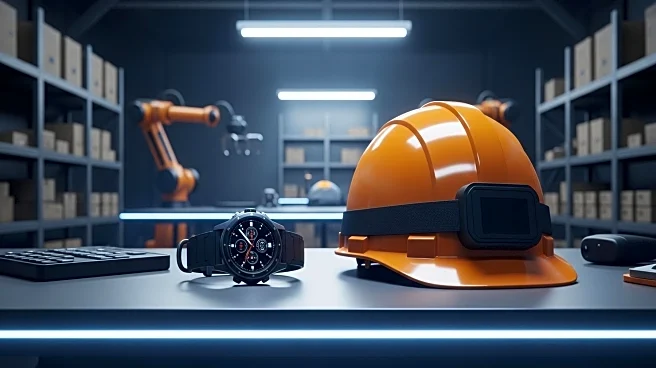What is the story about?
What's Happening?
The latest advancements in warehouse wearables are significantly improving productivity and reducing physical strain on workers. Key innovations include the Rufus Scan2 wearable barcode scanner, which allows hands-free scanning up to 50 feet away, and the Exia Augmented AI Exoskeleton by German Bionic, which provides up to 84 pounds of dynamic lift assistance. These devices are designed to optimize support in real-time by interpreting movement patterns and adjusting assistance accordingly. Other notable wearables include the ProGlove Index Trigger, which maximizes dexterity and reduces fatigue, and the HeroWear Apex 2, which reduces muscle fatigue and back strain by up to 40%. These technologies are being adopted across various industries, including logistics, manufacturing, and retail, to enhance operational efficiency and worker safety.
Why It's Important?
The integration of wearable technology in warehouses represents a significant shift towards more efficient and safer work environments. By reducing physical strain and increasing productivity, these devices can lead to lower injury rates and higher job satisfaction among workers. This is particularly important in industries with high physical demands, where worker safety and efficiency are critical. Companies adopting these technologies can expect to see improvements in operational efficiency, reduced training times, and enhanced worker performance. As the demand for faster and more efficient logistics grows, the adoption of such technologies could become a competitive advantage for businesses.
What's Next?
As wearable technology continues to evolve, further enhancements in AI and machine learning could lead to even more personalized and efficient support systems for workers. Companies may increasingly invest in these technologies to stay competitive and meet the growing demands of the logistics and manufacturing sectors. Additionally, as these devices become more widespread, there may be a push for standardization and regulation to ensure safety and effectiveness across different industries.
Beyond the Headlines
The adoption of wearable technology in warehouses also raises questions about data privacy and the ethical use of AI. As these devices collect vast amounts of data on worker movements and productivity, companies must ensure that this information is used responsibly and that workers' privacy is protected. Furthermore, the shift towards automation and AI-driven support systems may lead to changes in workforce dynamics, requiring new skills and training for workers to effectively use these technologies.

















